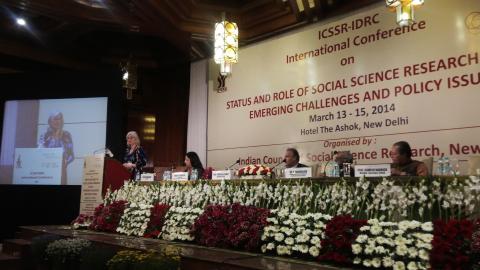By: Savita Verma
Send to a friend
The details you provide on this page will not be used to send unsolicited email, and will not be sold to a 3rd party. See privacy policy.
[NEW DELHI] Asian academics and policy makers have called for increased investments in social science research to leverage its inputs into informed policy making.
Governments in Asia should strengthen social science research, and create synergies between institutes, universities and think tanks engaged in social science research to address the continent's common problems of poverty, skewed development, and lack of access to social and economic opportunities, the experts told an international conference early this month.
Social science research has been hit by lack of funding and infrastructure, as well as lack of good-quality research proposals, the March 13-15 conference, supported by the International Development Research Centre (IDRC), was told.
"Social sciences have been relegated to a marginal position in policy making, not only in India but also in many other Asian countries," Sukhdeo Thorat, chairman of the Indian Council of Social Science Research (ICSSR), New Delhi, said.
Thorat said social science research was under-funded in India, with its budget forming a mere 2.3 per cent of funds for natural sciences research, and 11 per cent of medical sciences research.
Speakers from Japan, Malaysia, Nepal, South Korea and Thailand too noted a similar under-funding of social science research in their countries.
Sri Lanka saw general shrinking of research and development funds during its prolonged civilian conflict, with funds slipping from 0.3 per cent of its national wealth (gross domestic product or GDP) in 1996 to 0.16 per cent in 2010, said PRMP Dilrukshi, senior scientific officer at National Science Foundation, Colombo. It has just begun to pick up in the past couple of years.
In several cases, a large chunk of funding for the sector comes from international agencies whose priorities may not match national priorities.
An emerging concern is the bidding for government’s social science research funds by private companies such as McKinsey and PricewaterhouseCoopers, which are more interested in market research, said Alakh Narayan Sharma, editor, Indian Journal of Labour Economics.
This has resulted in a decline in the quality of social science research from public-funded institutions and universities, observed Gopinath Ravindran, member secretary, Indian Council of Historical Research.
In Nepal, for example, during the 1960s and 70s, most funding for research on development came from external agencies. In South Korea, "social scientists are now asking for more money (from Korea) to overcome western domination since funds for social science research come mostly from abroad, Suk-Ki Kong, research professor of Asia Centre at Seoul National University, said.
The lack of funds translates into a lack of autonomy for social science research institutions to choose their research topics. "What policy should be suggested for further research should be left to scientists," Sharma said.
Social science research has also been hit by lack of quality research proposals; and lack of institutional capacity with a tendency to rely on consultants. "Dependence on consultants does not give a chance for institution building," observed Ajaya Dixit of the Institute for Social and Environmental Transition-Nepal (ISET).
Social science research proposals in Sri Lanka are plagued by poor quality writing, while in Cambodia, social scientists are busy teaching in multiple institutions and have little time for research.
This article has been produced by SciDev.Net's South Asia desk.














